Sesame Street has introduced the subject matter of addiction, using a bright green puppet named Karli to let young viewers know grown-up problems aren’t their fault.
The character was first introduced in April as someone living in foster care and now her storyline has expanded to explain why she was placed in a new home.
Clips from the show feature the character – whose mother is battling an opioid addiction – with famous Muppet Elmo as well as a young girl named Salia Woodbury, whose parents are in recovery in real life.
‘My mom was having a hard time with addiction and it felt like I was the only ongoing through it,’ the fictional character tells Salia. ‘But now I’ve met so many other kids like us.’
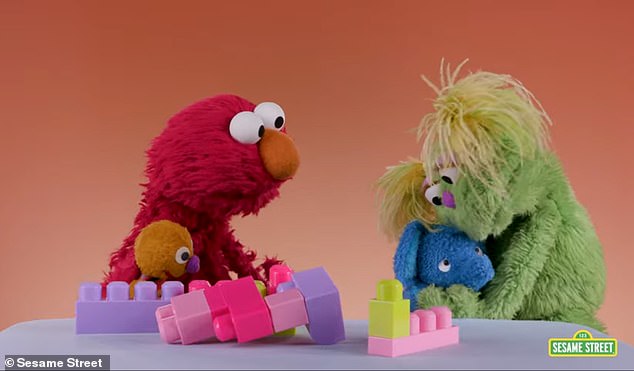
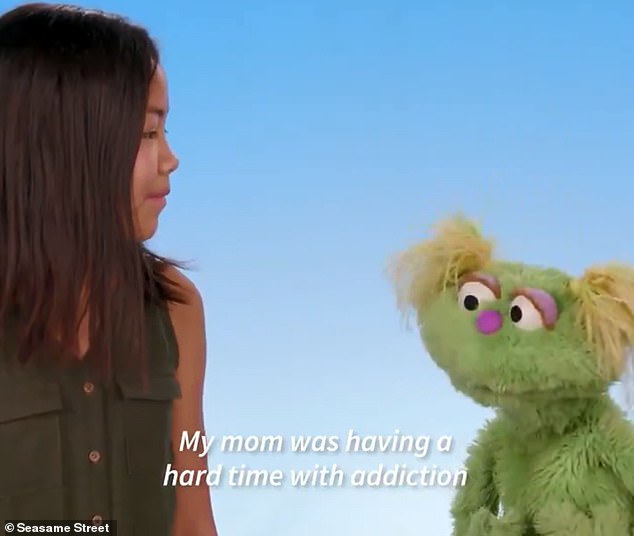
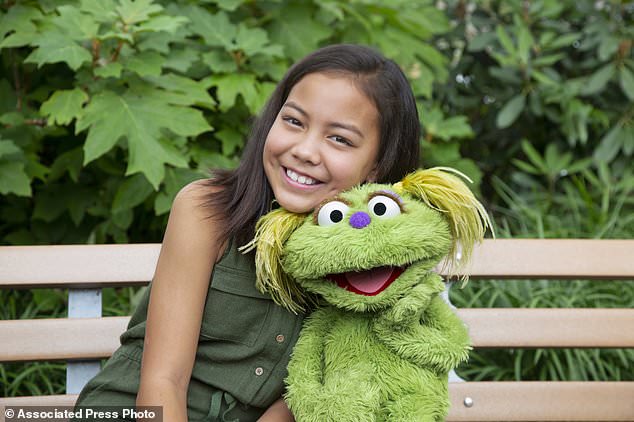
‘I’m so glad we’re friends, Salia,’ Karli says at the end of their segment.
‘Me, too, Karli,’ Salia responds.
‘Can I have a hug?’ Karli asks before they embrace it.
According to Sesame Workshop, the non-profit organization behind Sesame Street, the story shares the ‘words children need to hear most: You are not alone. You will be taken care of. Addiction is a sickness and, as with any sickness, people need help to get better. And most importantly: It’s not your fault.’
The bilingual resources now available at SesameStreetInCommunities.org provides an opportunity for children to build resilience in an age-appropriate way.
Karli may look familiar, as it’s the same puppet that portrayed Karina the Ballerina.
Viewers hear the newest character’s backstory before she joined foster parents Clem and Dalia. The six-and-a-half-year-old explains that her mom has ‘a grown-up problem’ and is battling addiction.
In another chat, demonstrating how play can help children speak about their concerns, Karli and Elmo appear with an elephant toy that accidentally knocks over building blocks.
‘It’s all my fault,’ Karli puppeteers on behalf of the elephant, leaving Elmo to reassure the blue toy, and inadvertently Karli, that it’s okay.
In the clip titled It’s Not Your Fault, Karli opens up: ‘Maybe she feels worried like I used to feel. My mom says that sometimes things happen that little monsters can’t control or fix and that those things aren’t their fault.
‘I used to feel like a lot of things were my fault, especially my mom’s problem but she told me no, it was a grown-up problem, it wasn’t because of anything I did.’
The pair then get back to good spirits and resume cheerful play with Elmo’s toy names Baby David.
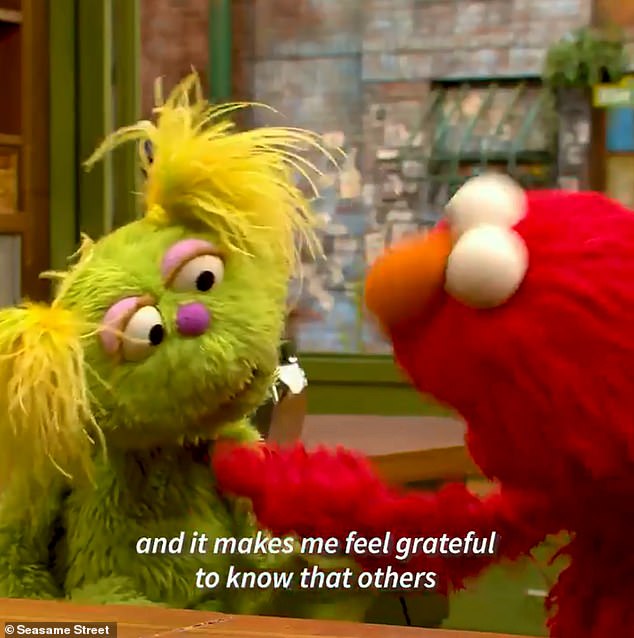
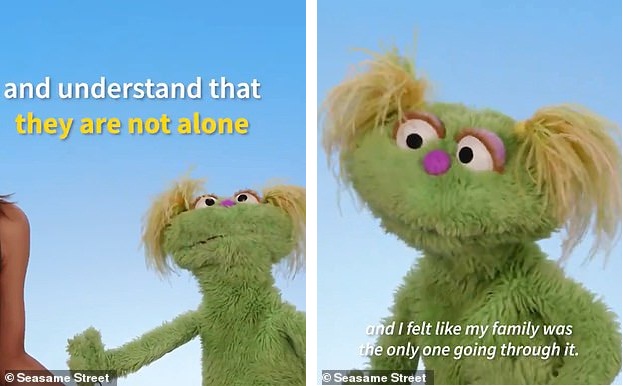
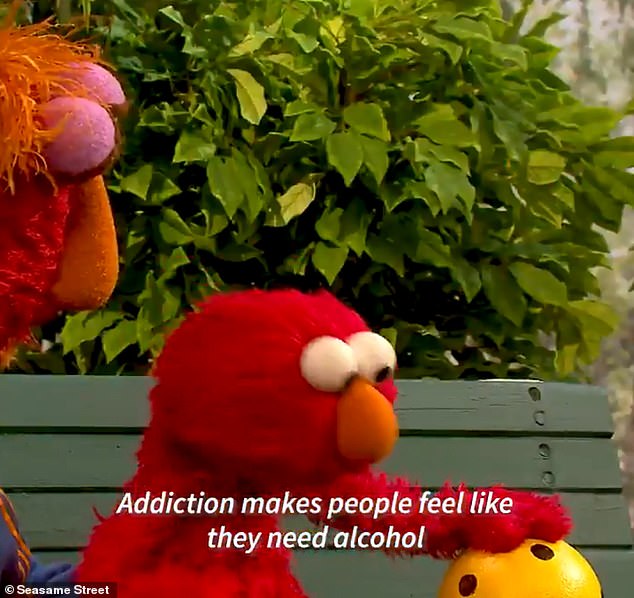
The initiative is part of the Sesame Street in Communities resources available online with creators explaining they turned to the issue of addiction since data shows 5.7 million children under age 11 live in households with a parent with substance use disorder.
Since 2015 the Communities sector has approached the subject of homelessness and traumatic experiences.
‘There’s nothing else out there that addresses substance abuse for young, young kids from their perspective,’ said Kama Einhorn, a senior content manager with Sesame Workshop.
‘Even a parent at their most vulnerable – at the worst of their struggle – can take one thing away when they watch it with their kids, then that serves the purpose,’ Einhorn said.
The online-only segments with pizza-loving Karli and 10-year-old Woodbury, are augmented with ones that feature Elmo’s dad, Louie, explaining that addiction is a sickness.
They also show Karli telling Elmo and Chris about her mom’s special adult meetings and her own kids’ ones.
Karli, voiced and manipulated by puppeteer Haley Jenkins, tells the camera: ‘Hi, it’s me, Karli. I’m here with my friend Salia. Both of our parents have had the same problem – addiction.’
‘My mom and dad told me that addiction is a sickness,’ Salia said.
‘Yeah, a sickness that makes people feel like they have to take drugs or drink alcohol to feel OK. My mom was having a hard time with addiction and I felt like my family was the only one going through it. But now I’ve met so many other kids like us. It makes me feel like we’re not alone,’ the puppet continued.
‘Right, we’re not alone,’ Salia responded. ‘And it’s OK to open up to people about our feelings.’
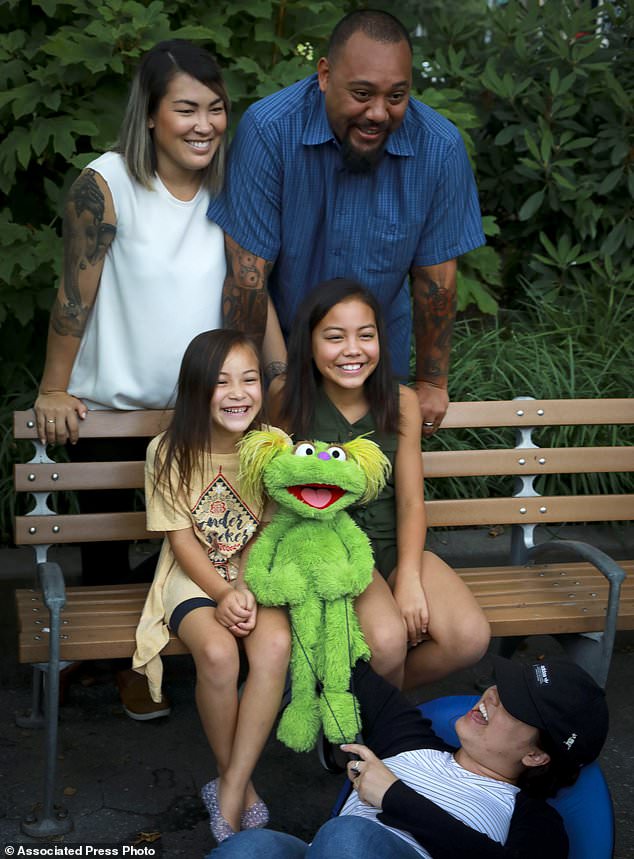
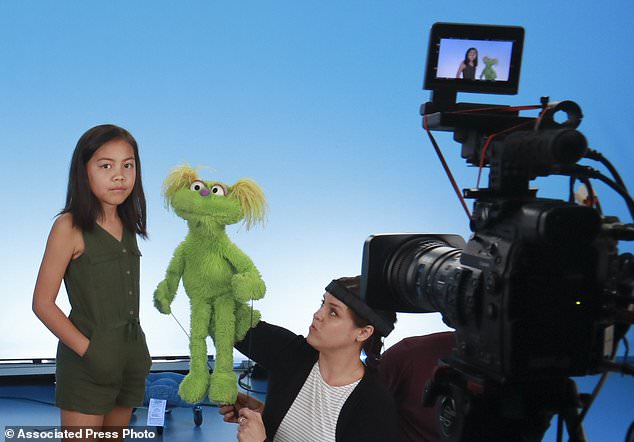
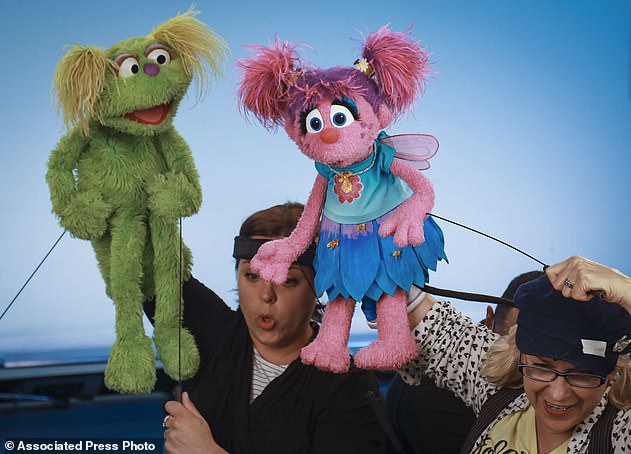
In the segment, Karli and Salia each hold up hand-drawn pictures of flowers, with multiple petals representing ‘big feelings’ – like anger, sadness, and happiness. They offer ways to feel better, including art and breathing exercises.
The segment leans on carefully considered language. Creators prefer ‘addiction’ to ‘substance abuse’ and ‘recovery’ to ‘sobriety’ because those terms are clearer to children. Despite the subject, the mood was light in the room, largely thanks to Jenkins’ calm and empathic manner.
‘I know it feels awkward because people don’t normally have conversations standing shoulder-to-shoulder,’ she told Salia between takes. ‘This is weird, but trust me, it looks good.’
Karli also opens up about her family to Abby Cadabby in another segment, and Karli tells Elmo about how she mistakenly used to feel like her mom’s addiction was her fault. Karli, Elmo, Rosita, and Abby Cadabby also sing ‘We’re Special and So Are You.’
Viewers are referred to free online resources in both English and Spanish that include videos, storybooks, digital interactives, and games.
Children’s therapist Jerry Moe, the national director of the Hazelden Betty Ford Children’s Program, helped craft the segments and resources, saying he was grateful to help since there’s been a paucity of resources for the preschool age-group.
‘These boys and girls are the first to get hurt and, unfortunately, the last to get help,’ he said. ‘For them to see Karli and learn that it’s not their fault and this stuff is hard to talk about and it’s OK to have these feelings, that’s important. And that there’s hope.’
‘Sesame Street,’ which began airing in 1969, has a long history of tackling topical issues in a way approachable to children. It’s had puppets with HIV, jailed parents and autism, explored homelessness, women’s rights and even girls singing about loving their hair.
‘For everything we’ve done – from military families to homelessness – it’s all about how to make children free to talk and to give parents the tools to do just that. They tend to avoid it and it’s what they need more than anything,’ said Sherrie Westin, president of global impact and philanthropy for Sesame Workshop.
‘Addiction is often seen as a “grown-up” issue, but it impacts children in ways that aren’t always visible. Having a parent battling addiction can be one of the most isolating and stressful situations young children and their families face.
‘Sesame Street has always been a source of comfort to children during the toughest of times, and our new resources are designed to break down the stigma of parental addiction and help families build hope for the future.’
Salia’s parents – Sam and Jaana Woodbury, who are raising four girls in Orange County, California – said they welcomed the show’s attention on opioid and alcohol addiction. They’ve been in recovery for about eight years.
‘When I was going through addiction, I felt extremely alone and isolated. I didn’t have any connection to the outside world,’ said Jaana Woodbury. ‘I think it’s amazing that ‘Sesame Street’ is using their platform to share resources to help other women and fathers.’
If you know someone who might like this, please click “Share”!
